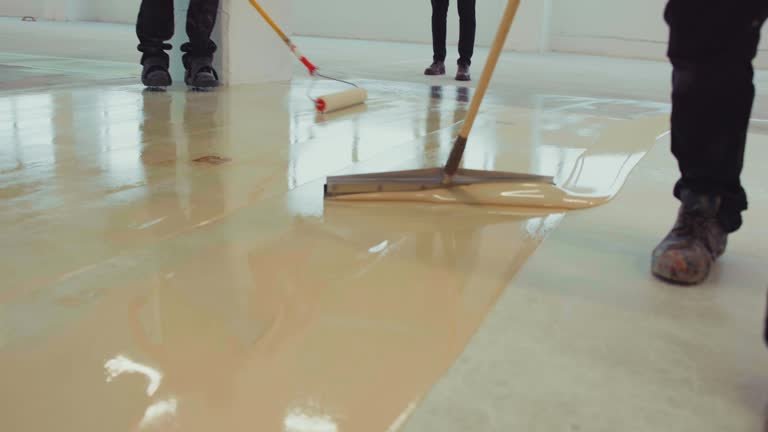Solid and Smart Epoxy Flooring Arrangements for Private & Commercial Spaces
Epoxy flooring has rapidly become one of the most sought-after flooring arrangements in both private and commercial spaces. Known for its quality, smooth wrap-up, and low-maintenance qualities, this floor coating is connected over concrete surfaces to make a high-performance, solid surface that keeps going for a long time. At YRC Custom Flooring, LLC, we specialize in making customized epoxy floors that flawlessly adjust aesthetics and functionality.
What is Epoxy Flooring?
Epoxy flooring is a surface made by applying numerous layers of epoxy gum onto a concrete floor. It comprises two essential components: a tar and a hardener. When these are blended, a chemical response happens, shaping a solid plastic fabric. This comes about in a surface that’s both outwardly engaging and able to withstand overwhelming loads, chemical spills, and foot traffic.
Key Services of Epoxy Flooring
Durability
One of the fundamental reasons property holders and trade proprietors select epoxy is its unmatched strength. It stands up to wear and tear from apparatus, vehicles, and foot activity, making it perfect for carports, stockrooms, and mechanical spaces.
Simple Maintenance
Thanks to its non-porous nature, epoxy flooring doesn’t trap clean flotsam and jetsam or spills. Standard clearing and periodic cleaning are all that’s required to keep up its shine.
Tasteful Appeal
Epoxy floors come in an assortment of colors, surfaces, and patterns—including metallic and drop systems—allowing you to tailor the look to coordinate with your planned vision.
Chemical & Recolor Resistance
Spills from oils, gasoline, or cleaning specialists won’t leak into the surface, making epoxy incredible for auto shops and commercial kitchens.
Security Enhancements
Anti-slip added substances can be joined into the epoxy to make strides in grasping and minimizing slip-and-fall mischances, particularly in damp or high-traffic areas.
Types of Epoxy Flooring
Self-Leveling Epoxy
Perfect for worn-out concrete surfaces, this sort makes a smooth, consistent wrap-up. Frequently utilized in showrooms, kitchens, and garages.
Epoxy Mortar Flooring
The most grounded sort of epoxy, made from strong epoxies and reviewed sand, is best suited for heavy-duty mechanical settings.
Quartz-Filled Epoxy
Combines high-performance epoxy tar with colored quartz grains for an enriching and solid finish.
Anti-Static Epoxy
Ideal for delicate situations like electronic fabricating offices, this flooring avoids inactive power buildup.
Metallic Epoxy Coatings
A fabulous choice for cutting-edge contribution, these coatings make a reflexive, marble-like appearance.
Where is epoxy flooring commonly used?
Garages
Epoxy coatings are a prevalent choice for private carports due to their resistance to oil stains and tire marks.
Basements
They offer assistance to ensure against dampness and give a cleaned space for unfinished spaces.
Commercial Kitchens
The consistent surface makes a difference in meeting sanitation benchmarks and is simple to clean.
Retail Stores & Showrooms
Attractive and simple to keep up, epoxy flooring makes items stand out.
Mechanical Warehouses
With its capacity to persevere through forklift activity and chemical spills, epoxy is a go-to for mechanical floors.
Installation Handle of Epoxy Flooring
Surface Preparation
This step includes cleaning, repairing splits, and, in some cases, crushing the concrete to guarantee appropriate adhesion.
Preparing the Floor
A ground coat is connected to make a holding layer between the concrete and epoxy.
Blending & Applying Epoxy
The tar and hardener are blended and poured equitably over the surface.
Wrapping-up Touches
Depending on your plan inclinations, chips, metallic shades, or anti-slip materials are added.
Curing Time
The floor is cleared out to remedy for 24–72 hours, depending on the framework and surrounding conditions.
Maintenance Tips for Epoxy Floors
- Sweep routinely to evacuate tidy and grit.
- Use a delicate, clean, and delicate cleanser for more profound cleaning.
- Avoid utilizing rough cushions or acidic cleaners.
- Place mats at passages to decrease earth accumulation.
- Address spills rapidly to keep the surface looking new.
Environmental & Wellbeing Services
Epoxy floors are VOC-compliant and non-toxic once cured. Their consistent surface disheartens the development of shape and microscopic organisms, making them appropriate for clinics and cleanrooms. Furthermore, they diminish the need for unforgiving chemical cleaners, advertising a more eco-friendly upkeep routine.
FAQs
Q1: How long does epoxy flooring last?
An appropriately introduced epoxy floor can last 10 to 20 years or more with normal upkeep, depending on activity and usage.
Q2: Can I introduce epoxy flooring myself?
While DIY packs exist, proficient establishment guarantees way better toughness, appearance, and adhesion.
Q3: Is epoxy flooring slippery?
When dry, epoxy floors can be dangerous. Be that as it may, anti-slip added substances can be joined to increment traction.
Q4: How long some time recently can I utilize my floor after installation?
Typically, the floor can handle light foot activity inside 24 hours and overwhelming use in 72 hours.
Q5: Can epoxy be connected over tiles or other surfaces?
In a few cases, yes. In any case, for best results, epoxy ought to be connected to clean, arranged concrete surfaces.
Final Thoughts
Epoxy flooring stands out as a down-to-earth, outwardly dazzling, and long-lasting arrangement for different spaces—from private carports to commercial showrooms. With legitimate establishment and upkeep, it offers unparalleled esteem and execution. Whether you’re upgrading your domestic, upgrading your trade, or contributing in a solid mechanical arrangement, epoxy flooring conveys both fashion and quality.


